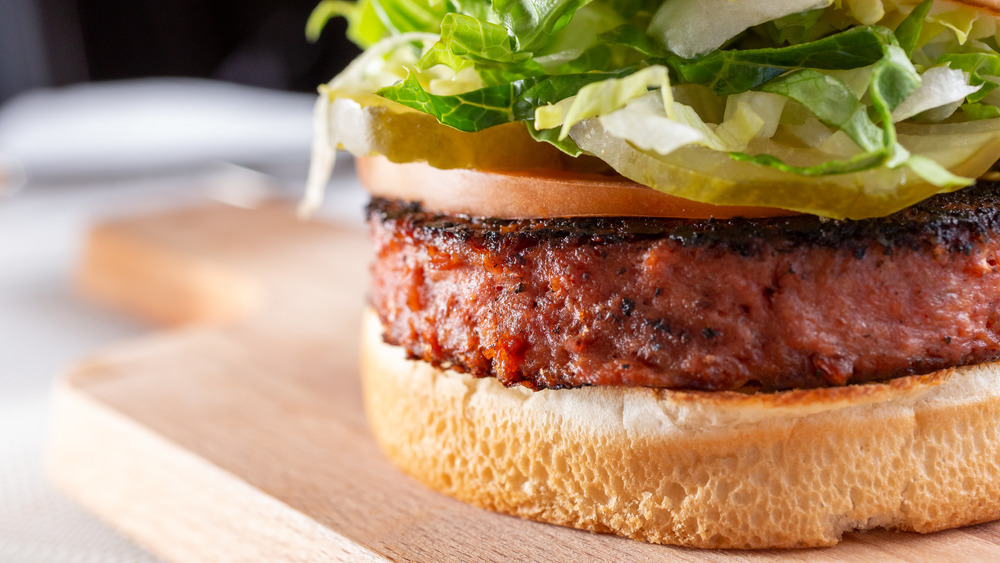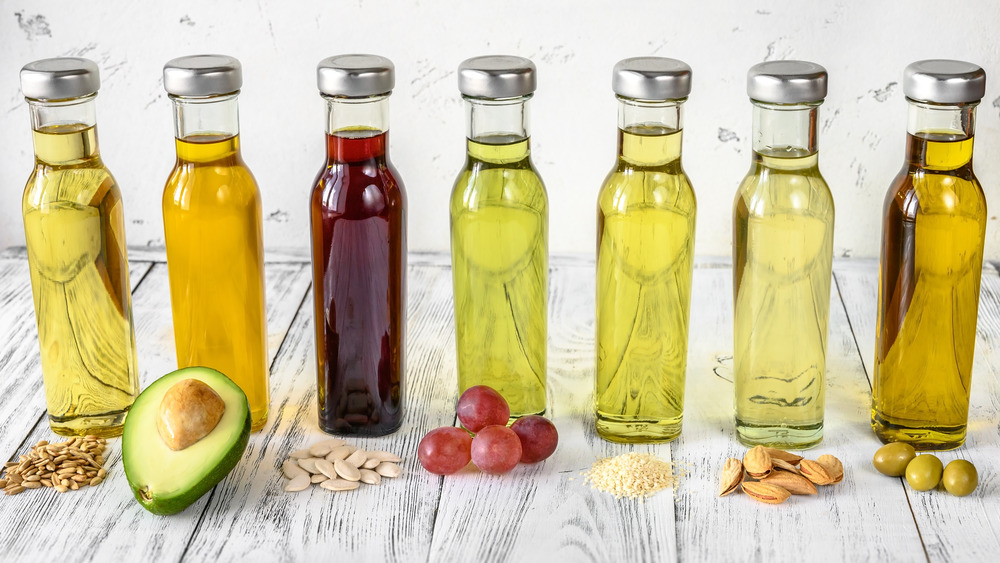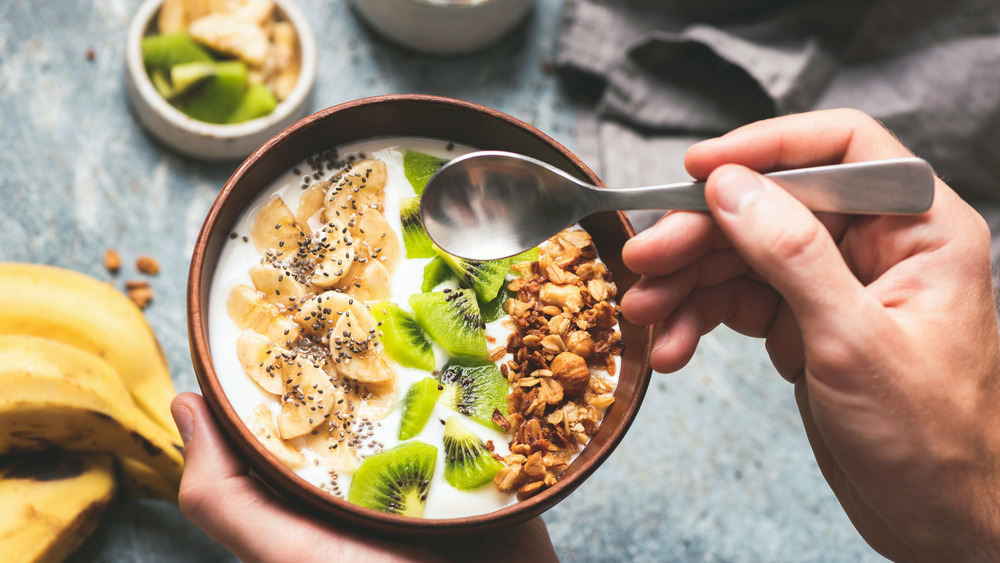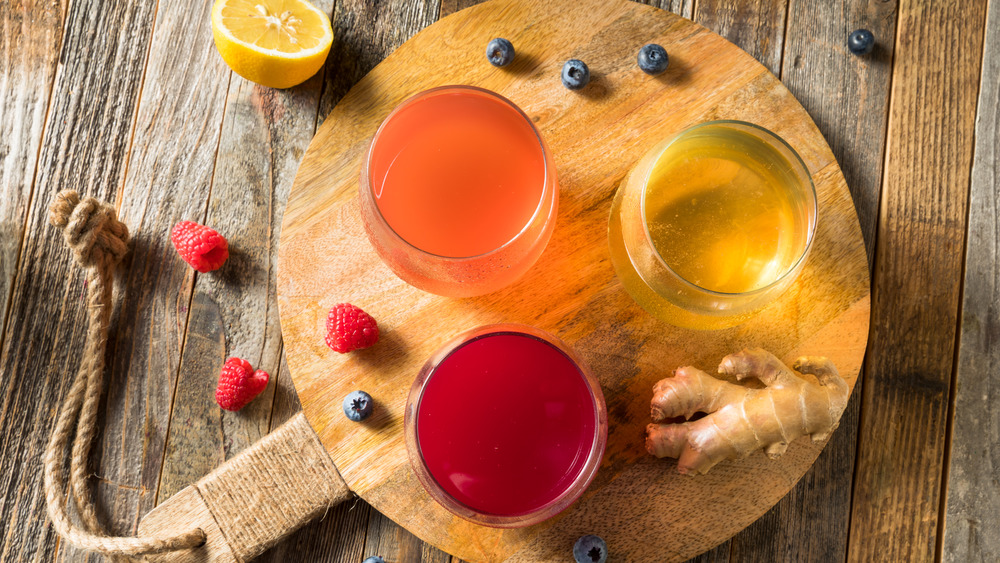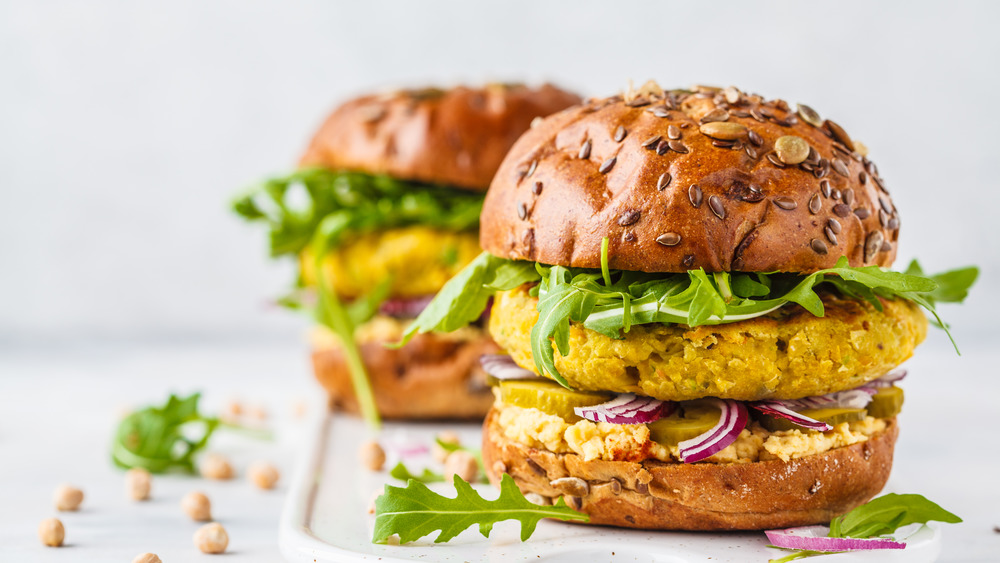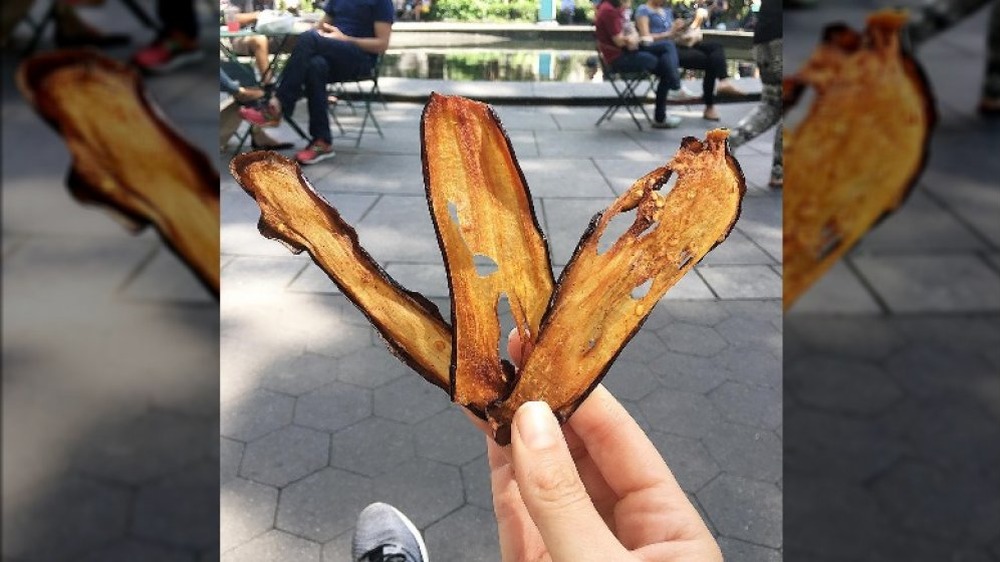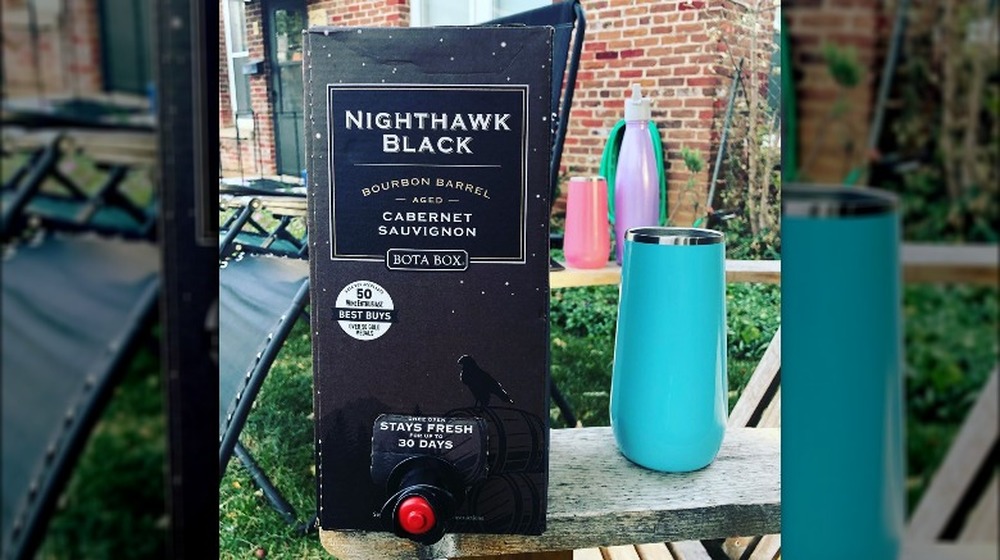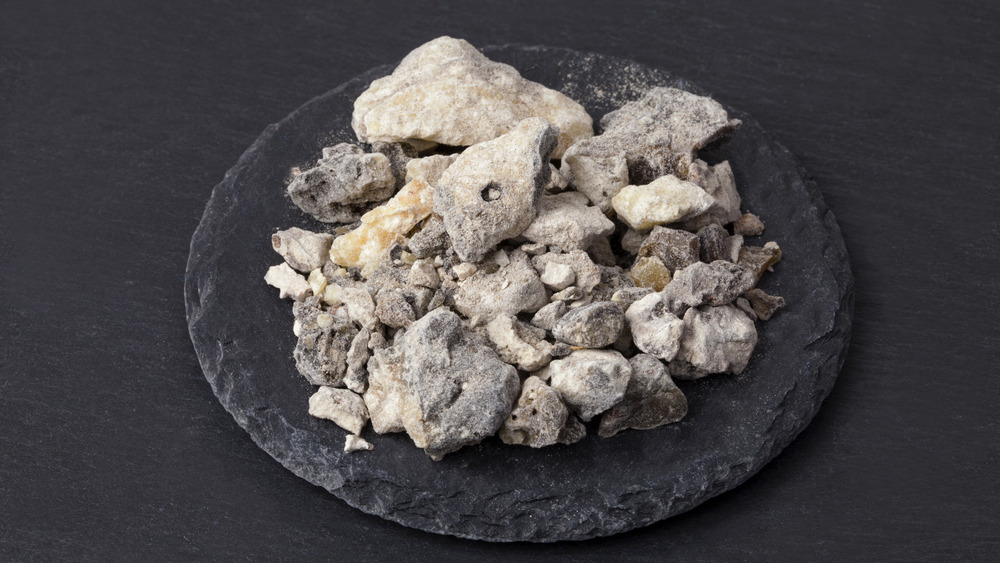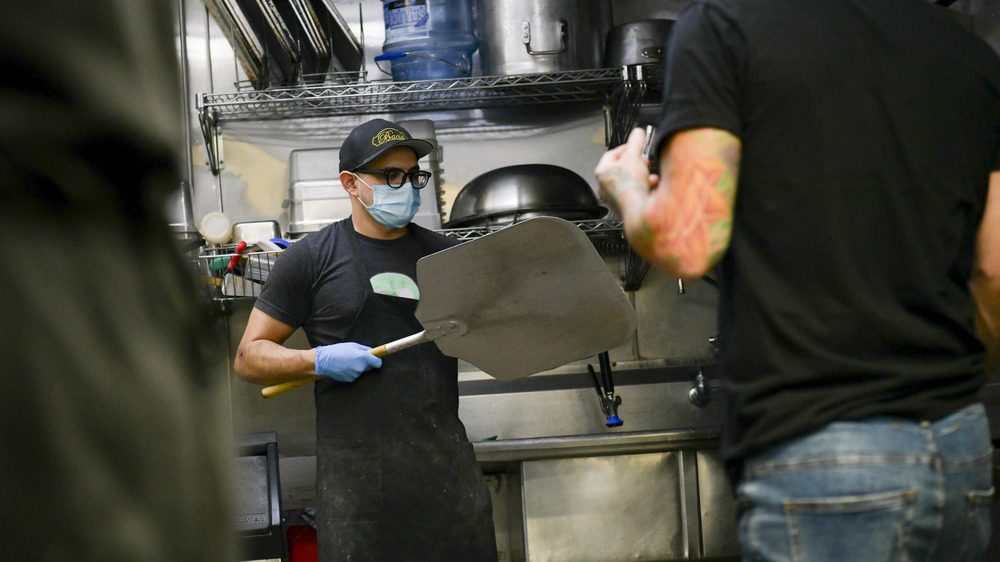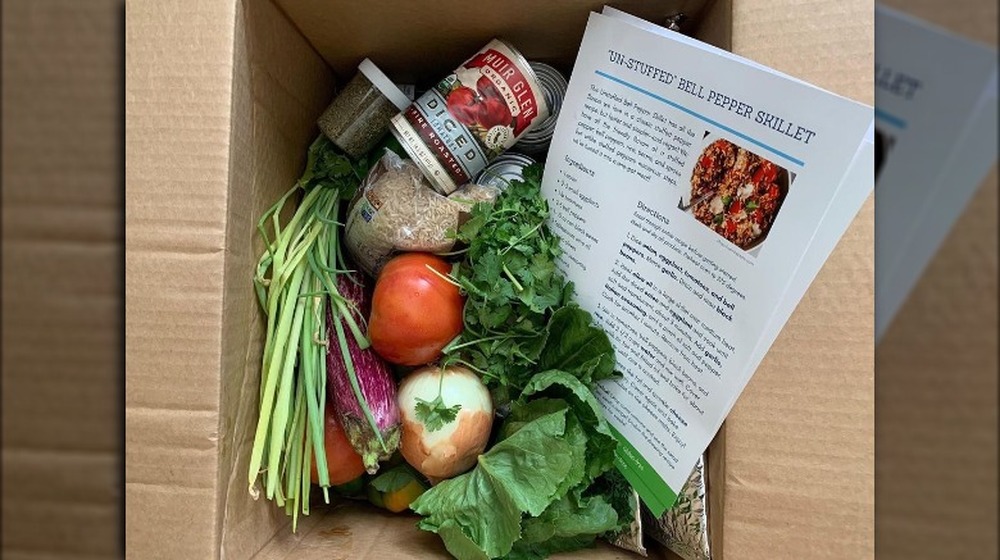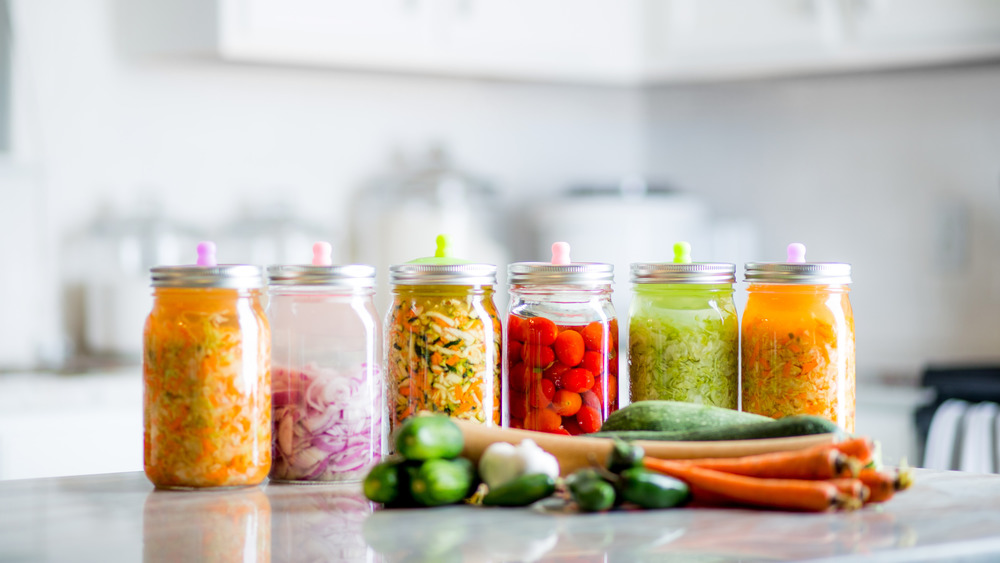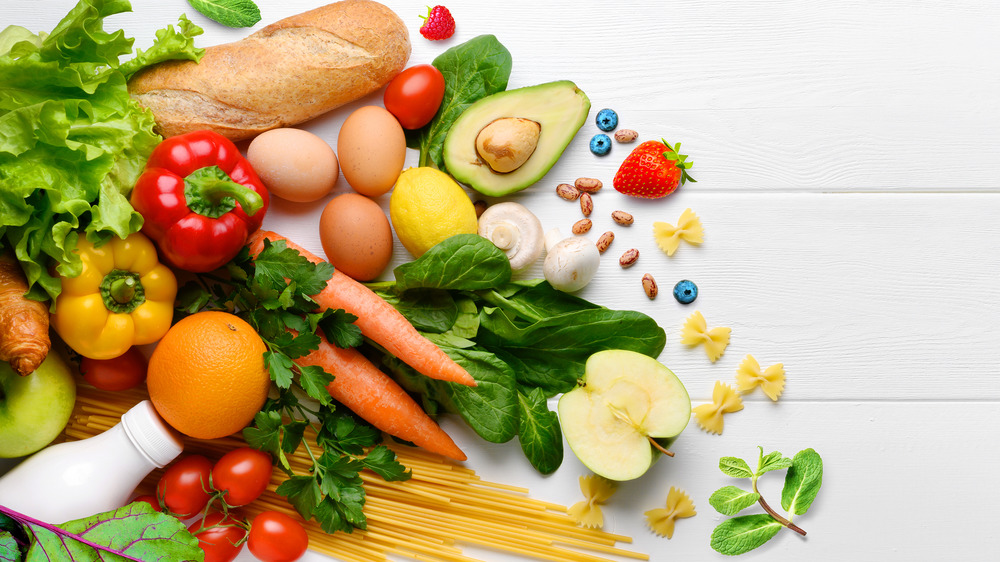Food Trends That Are About To Take Over 2021
2020 has been a heck of a year ... but you don't need us to tell you that. For most people, it's likely going to be a huge relief to be able to draw a line under the last year or so, and look forward to — hopefully — a better year to come.
It's been kind of a weird year for food, too. The rapid spread of COVID-19 and ensuing global lockdowns forced an adjustment in our eating and drinking habits, mostly as a way of coping with the new normal. Baking has made a huge comeback, online shopping has become the norm, and, let's face it, many of us are getting way more takeout than we were before. Many of us are also drinking a lot more, too — while others are taking the opportunity to cut down on their booze intake, instead.
But what's going to happen as we march wearily (and warily) into 2021? Which food trends are going to be taking off in whatever world we find ourselves in? From novel ways of dining out to fresh ingredients to a whole new slew of healthy-eating initiatives, these are the food trends that are about to take off in 2021.
Alternative cooking oils will be a thing in 2021
Bored with vegetable oil? Over olive oil? Well, you're in luck. In October 2020, Whole Foods published a report predicting the trends that'd be taking over the world of food in 2021. Among others, the company suggested that next year will see a range of new oils rise in popularity among at-home chefs. These include walnut and pumpkin seed oils, which are said to imbue their dishes with an earthy, nutty flavor.
And there's every reason to believe Whole Foods are right, too. According to Healthline, walnut seed oil has a number of health benefits: it's good for your skin, helps lower blood pressure, improves cholesterol levels, and may even have anti-cancer effects. Meanwhile, pumpkin seed oil can have a positive effect on your skin, heart, and prostate, is said to ward off depression, and may even relieve some of the symptoms of menopause.
But if you'd rather use a more traditional oil in the kitchen, have no fear: because, according to Food Business News, 2021 will also see olive oil reach news heights of popularity among healthy-eaters. Food trend forecaster Elizabeth Moskow said this comes down to elenolide, a component in olive oil with anti-hypertensive and anti-inflammatory properties, as well as tyrosol, another compound that protects against neurodegenerative diseases. "We're going to start seeing infusions of olive oils on plates," Moskow explained, "and chips and snacks that use olive oil as the call-out rather than avocado and coconut oil."
Upcycled food could be a 2021 food trend
In 2019, Forbes reported that the upcycled food industry was worth $46.7 billion. Then, in May 2020, the term "upcycled food" was officially defined by the Upcycled Food Association, made up of a group of representatives from Harvard University, Drexel University, Natural Resources Defense Council, World Wildlife Fund, and the food waste nonprofit ReFED. Upcycled food also made it onto Whole Foods' list of 2021 food trends. By all accounts, this is going to be a pretty big deal going forward. But just what is it?
Well, the Upcycled Food Association defines upcycled food as "use ingredients that otherwise would not have gone to human consumption, are procured and produced using verifiable supply chains, and have a positive impact on the environment." It's essentially a way of tackling food waste and becoming more sustainable at the same time.
And while you may not have come across much upcycled food in your grocery store — yet — there are a number of products out there that meet this definition. White Moustache, a Brooklyn-based yogurt company, uses surplus fruit and whey for its products; WTRMLN WTR makes flavored waters from what the food industry refers to as "discarded" melons; RISE Products makes flour from spent grains; and Toast Ale makes beer brewed from surplus bread. These are just a few examples, too, and it appears that more and more companies are making the most of pretty much whatever they can get their hands on.
Get ready for the hard kombucha food trend of 2021
Hard kombucha is pretty much what it sounds like: fermented tea that, unlike regular kombucha, has a significant alcohol content. Of course, kombucha has become one of the trendiest and most prolific drinks over the last few years, thanks in part to its perceived health effects — although, it's worth noting that these are actually a little controversial.
Nevertheless, it was only inevitable that a drink as popular as kombucha would turn hard eventually, and 2020 saw alcoholic kombucha hit the scene in a big way. According to (via Forbes) Kombucha Brewers International, sales of hard kombucha grew from $1.7 million in 2017 to more than $12 million in 2019. A number of companies then saw their successes increase further during 2020, with JuneShine Hard Kombucha having been on track to triple its sales that year, and AfterGlow Hard Kombucha expanding nationwide.
In the future, it seems likely that hard kombucha will be primed to overtake other alcoholic drinks in popularity. Bart Watson, chief economist for the Brewers Association, told Kombucha Brewers International (via the Fermentation Association): "If [people] are drinking more of one thing, they're drinking less of another. You're not going to add to the drinking, you're just going to have to take from someone."
In short? Goodbye IPAs, hello hard kombuchas.
Plant-based meat will remain popular in 2021
In 2019, a report suggested that, by 2040, 60 percent of meat consumed by people will be either "grown in vats" or "replaced by plant-based products that look and taste like meat" (via The Guardian).
It's a bold assertion, but holds some credence considering the massive rise in popularity enjoyed by plant-based meats and proteins over the last few years. Thanks to the pandemic, 2020, in particular, saw a whole new level of consumer interest towards meat-free meat, with sales up 264 percent over March and April in U.S. grocery stores. The industry is making new innovations and putting out fresh products, too, with many companies, such as Impossible Burger and Beyond Meat, solidifying their leading positions in the market.
All in all, the plant-based meat industry seems set to reach new heights in the years to come. Indeed, according to Tasting the Future, forecast growth of meat alternatives is projected to reach $480.43 billion by 2024. According to the outlet, an increased focus on the sustainability and health benefits of plant-based meats, heightened popularity of legumes (such as chickpeas and split peas) used in alternative meats, a "renewed focus on taste and texture," and new plant-based foods such as fish, cheese, milk, and chicken will all help the meatless meat market meet those expectations.
But if you're still not convinced, then how about the fact that McDonald's will finally offer their own plant-based burgers in 2021? Talk about going mainstream.
Add plant jerky to the list of 2021 food trends
Plant-based burgers may be all the rage already, but there's a good chance you haven't yet come across plant-based jerky. Well, that might be about to change, as consumers increasingly find themselves turning to what, in 2020, Entrepreneur called the "sustainable snack of the future."
Jerky, of course, has always been a hugely popular snack food. It's tough, it's hardy, it's non-perishable, and it's packed full of protein. But as the plant-based food market has grown, so too has the public's hunger for a healthier, more environmentally-friendly alternative. Food startups are experimenting with a range of protein alternatives, including mushrooms and soybeans, with one of them, Leaf Jerky, opting to go the whole hog (figuratively speaking, that is) and using recycled packaging, too.
Elsewhere, Upton's Naturals are launching a wheat protein jerky, while another, Savory Wild, are infusing their mushroom jerky with flavors such as sweet balsamic and golden fig, roasted garlic and black pepper, and ginger and Korean chili. Basically, this is far fancier than your average store-bought beef jerky.
It's also possible — easy, in fact — to make your own plant jerky at home, and you can use pretty much any vegetable you like to do so. Jackfruit, cauliflower, and eggplant, for example, have all been cited as great starting points. Honestly, who needs turkey jerky?
Boxed wine isn't going away in 2021
Ah, boxed wine. Who among us can say we haven't succumbed to temptation and curled up at home with what seems like an entire crate of vino to keep us company? Well, thanks to the pandemic, it seems like the answer to that question is: basically nobody.
According to Star Tribune, boxed wine became a "pandemic staple" after consumers started bulk-buying inexpensive wines during the first rounds of lockdowns. In the 15-week period ending June 13, boxed wine sales jumped 36 percent compared to the same period in 2019. Anissa Gurstel, a wine buyer for Lunds & Byerlys, told Star Tribune that "we have seen an astronomical rise in boxed-wine sales. [Boxed wines are very 'of the moment.'"
But will this trend carry on into 2021? It sure looks like it, mostly thanks to the fact that boxed wines have risen in quality, thanks to improving growing and winemaking techniques, as well as an increase in wine imports from overseas. And these same companies are marketing to young people for the first time ever. Guy Willenbacher of Blue Ventures Wine Marketing told Star Tribune: "Instead of being a badge of poor taste, boxed wine has even become a popular quarantine prop for Instagram photos.".
Now that the stigma has vanished, the quality has improved, and whole new demographics have emerged, it's becoming increasingly clear that, far from being a flash-in-the-pan pandemic fad, boxed wine really is here to stay.
Copaiba could be a 2021 food trend
No, it's not a Barry Manilow song. Copaiba is an essential oil that, according to Food Business News, shares a number of properties with cannabidiol. It comes from the resin of the Copaifera tree, and is said to have an "earthy, woodsy flavor." Like CBD, it has a number of health effects, and can be used to treat inflammation, chronic pain, and anxiety. It can also help reduce blemishes or even be used as an aromatic compound to help create a calm and relaxing environment. According to Scott Johnson, Director of Education and Training at doTERRA: "When used daily, Copaiba helps you live a longer and healthier life with greater periods of homeostasis." And the best part of all? It's totally legal.
"We think we'll see copaiba as a competitor to CBD in food and beverage products," Elizabeth Moskow told Food Business News. This seems doubly likely since it has a number of advantages over CBD, including the fact that it's far less expensive, and there's no risk of finding trace amounts of THC in the oil (if that is, indeed a risk to you). Copaiba oil isn't known to have any side effects either, and it will have no impact on any drug test.
As CBD becomes more popular, and a growing number of U.S. states legalize marijuana, it's only inevitable that this nifty little alternative will also become increasingly prolific.
Ghost kitchens may become a 2021 food trend out of necessity
Just a quick heads up to save you some disappointment: ghost kitchens aren't what they sound like. No, there's sadly nothing spooky in sight here — just an innovative new way of bringing you food.
Also known as "dark kitchens," ghost kitchens are delivery-only cooking establishments, often featuring food from more than one restaurant brand. They've got cooking facilities, chefs, and a wide range of recipes, but nowhere whatsoever for customers or diners to sit, order, or eat. Instead, the customer takes to a platform such as UberEats or GrubHub, chooses what they want, and gets it delivered to their door. Often, because they utilize a range of brands and styles, customers can order a mish-mash of cuisines in one go.
These places have a load of advantages over traditional dine-in restaurants. For one, they're cheap and easy to set up, since you don't need to build a brick-and-mortar restaurant; all you need is a kitchen. They're also low-risk, with fewer overheads, permits, inspections, and rent payments for entrepreneurs and investors to worry about. And with a tragic number of independent restaurants having to shut down as a result of the COVID-19 pandemic, there's every chance many will reopen as ghost kitchens in the future. Throw in a customer base that's becoming more comfortable with ordering take-out by the day, and you've got a real recipe for success.
Meal-kits will continue to be a booming food trend in 2021
One other way customers have managed to cope in the changing landscape of the pandemic is by utilizing meal-kits. This is a very simple concept — essentially, it's a box full of ingredients you need for a particular recipe, often pre-prepped, which only require assembly and cooking. Some companies offer subscription services while others are available as one-offs.
Inevitably, meal-kits have become more popular in the wake of COVID-19. According to Brian Irwin, VP of marketing for the meal-kit service Home Chef: "Sales have increased materially since the start of the pandemic and have remained high week after week. We have had greater sales both from existing customers as well as new customers. Customers continue to buy more meals per delivery, and order more often."
Meanwhile, companies such as HelloFresh have seen their revenues increase by upwards of 50 percent in 2020, and are continuing to pour money into technology, infrastructure, and marketing, with the aim of enticing newer customers into the fold.
It's yet to be seen whether this growth will continue at such a pace once the pandemic comes to an end, but with meal-kit companies becoming more steadfast in their efforts to seize the market, and top restaurants offering meal-kits as takeout alternatives, it seems likely we'll be seeing these become more commonplace over the next year.
More consumers will reach for gut-friendly food and drinks in 2021
Foods that promote gut health have been in vogue for a few years now. However, customer awareness of gut microbiome, and how to keep it healthy, has increased greatly in the last year, thanks to — you guessed it — the COVID-19 pandemic. Findings from ADM's consumer insights platform suggest the gut is a "gateway to wellness," and indicate that awareness of this topic counts as one of the significant behavioral and societal changes that have taken place during the pandemic. Going into 2021, the company says, "the gut microbiome's role in weight, mental health, and immunity will become a global trend."
ADM also predicts a few other, similar trends to occur over the next year. "Consumers are gravitating towards food and beverages with bright and exciting colours that indicate citrus flavours," they say, "with their naturally occurring Vitamin C, as well as products with familiar, nostalgic flavours during these stressful times."
They also suggest greater transparency in the production process to come to the fore, predicting: "Consumers expect food labels to provide greater transparency around the entire product life cycle helping drive the demand for locally sourced products as consumers seek greater clarity on where the ingredients in food and beverages come from."
Put simply: expect lots of colorful, flavorsome, locally-sourced, and gut-friendly food and drinks to hit grocery store shelves. Doesn't sound so bad, does it?
Simply put, healthy eating will be a 2021 food trend
So, you've probably noticed a trend hidden among these trends: healthy eating. Yes, as a result of that hugely terrible thing that has happened to all of us this year, it appears that people are ready to live healthier lives. In October 2020, Forbes reported that one of the primary trends we're going to see in 2021 is a move towards healthy, sustainable, and environmentally-friendly eating. Covid-19 caused many Americans to take a deeper look at the food they consume and how it affects their stamina, immunity, and overall health.
To this end, shoppers are now choosing foods more carefully, reading labels, learning about ingredients, and making decisions based on where their foods come from. The International Food Information Council's 2020 Food & Health Survey found that 54 percent of all customers care more about the "healthfulness" of their food and beverage choices in 2020 than in 2010. Active dieting has increased, 18 percent of Americans are using health monitoring apps and devices, and 28 percent of Americans are eating more proteins made from plants.
Even when the pandemic ends, it's not hard to imagine that people will remain wary of how their eating habits affect them. All in all, it's likely that most of us will be eating healthier throughout 2021 — and beyond.
